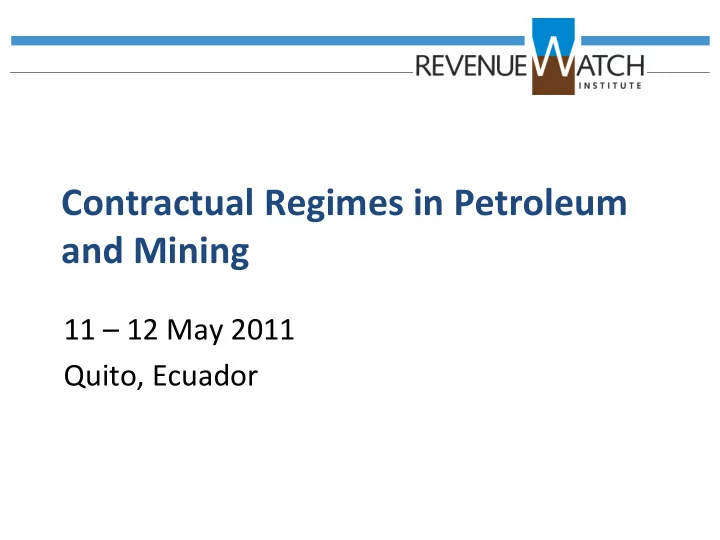

Contractual Regimes in Petroleum and Mining 11 – 12 May 2011 Quito, Ecuador
Presentation Outline • Brief overview of common types of Contracts in Petroleum and Mining • PSAs • Tax/Royalty • Service Agreements • Differences, Similarities and Trends
Purpose of a Contract • A contract is the instrument by which the State grants the right to exploit petroleum or minerals and codifies the rights the responsibilities of the parties. • Contracts should conform to the State’s legal regime.
Types of Contracts e.g. UK, US, Australia e.g. Indonesia, Angola e.g. Iraq, Bolivia
Types of Agreement • Concession (Royalty/Tax System) – Right to produce and sell from a license area with a fixed royalty on production and tax on profit • Production Sharing Contract – Right to produce and sell sufficient petroleum to recover costs and an agreed share of ‘profit oil’. Government has right to lift and sell its own share of production • Service contract – Companies are paid a fixed fee per barrel to cover costs and an agreed margin
Fiscal Regimes are Complex in detail Courtesy Graham Kellas
Royalty/Tax System Revenue From Mining/Petroleum Royalty Gross Revenue To Investor Profit Production Cost After-Tax Profit Profit Tax Investor’s Govt. Dividend Equity Dividend W/H (minus W/H tax) tax Government Revenue Investor Return
Angola PSA Structure Total Oil Extracted Cost Oil Profit Oil Sales by Private Sales by Sonangol Companies Sonangol 90% of Profit Tax: 50% of Keeps 10% of Revenues Go its Revenues to Treasury their Profits
Bolivia Operating Contract (2006) Crude Gas Sales by YPFB After-Royalty Net (50%) IDH (32%) + Royalty (18%) Recoverable Costs Distributable Profits [C/F = YPFB Contractor Fee C/F Share* (Retribución al Titular)] [P/T = After- Company Tax P/T Profits Tax Profit (25%)] * YPFB Share in Profits ranges Investor Government Revenue from 1 – 72%, based on a formula Return incorporating profitability, production levels, and price
Source: Daniel Johnston (1994) Government Take at $20/BBL and $60/BBL, changes are a function of design. Government Take @ $20/BBL & $60/BBL Participation % ERR % 90% 80% 70% 60% 50% 40% US OCS Deepwater 0 0 Few systems are New Zealand 0 5 UK 0 0 progressive today Trinidad Deepwater 25+ 0-25 Philippines 0 13.5 World Average 30 20 Gabon 10 22 Azerbaijan AIOC 10 0 Malaysia Deepwater 13 15 Indonesia 3rd Gen 10 5 Russia Sakhalin II $20 $60 Oil Price 0 6 Egypt Onshore 0 38 R/T Nigeria Shelf 0 18 PSC UAE ‘OPEC Terms’ 12.5 60 Libya Avg 2005 81.5 SA 81.5 Venezuela 1996 35 35 World Avg Libya Block 124 89 89
SERVICE CONTRACT INCENTIVES IN INTERNATIONAL COMPARISON • Bolivia Service Contract (2010) • Service fee with remuneration of Production Costs • Incentive to increase investment/costs • Risk of “gold plating” and/or inducing corruption • Need for Transparency in remuneration of costs • On the other hand, is also a subsidization of Contractor investments in new and high-technology
SERVICE CONTRACT INCENTIVES IN INTERNATIONAL COMPARISON • Ecuador Service Contract (2010) • Two-tier Tariff • Tariff 1: Pure service fee based on fee-per-barrel • Company negotiates a Tariff rate-per-barrel • Service Fee=Tariff*production • Incentive to reduce investment/costs • Tariff 2: Risk Remuneration • Not set in contract, to be negotiated after demonstrated existence of New Fields or Increase in the recovery factor of Commercially Exploitable Reserves (Clause 12.3) • Tariff 2 negotiation must include (1) Capital Investment, (2) estimation of Operating Expense, and (3) a reasonable profit of X amount (set by contract, between 20-25%) • Incentive to undertake risk investment
SERVICE CONTRACT INCENTIVES IN INTERNATIONAL COMPARISON • Fee-per-barrel Service Contracts & Price Increases
SERVICE CONTRACT INCENTIVES IN INTERNATIONAL COMPARISON • Mexico Integrated Service Contract (2010) • Service fee based on fee-per-barrel • Company bids on Tariff rate-per-barrel • Service Fee=Tariff*production • Incentive to limit investment/costs • Progressive Remuneration Plan • Possible adjustment for R-Factor or depletion allowance (“squeeze”) • Neutral to Contractor
Other types of agreements to be aware of • Infrastructure linked agreements • Joint Operating Agreements (JOA’s) • Unitisation Agreements
Recommend
More recommend